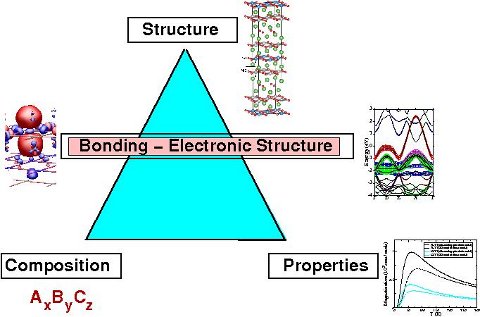
Electrons play the crucial role in controlling most of the properties of materials and providing the microscopic understanding. Understanding of electronic structure is therefore of immense importance in the field of materials research. Most materials of present day interest are rather complex in their structure, involving several hundreds of atoms in the unit cell and having components which range through the periodic table. The theoretical study of electronic structure thus involves extensive computational effort, particularly for such complex materials of interest. Electronic structure calculations based on density functional theory within local density approximation (LDA) or generalized gradient approximation or LDA+U has turned out to be a major success in this direction.
Our works involve density functional calculation of electronic structure and cohesive properties of complex crystalline materials within the framework of DFT. These also involve derivation of simplified low energy few band tight-binding models based on these DFT calculations to understand the complicated physical processes taking place in these systems. These methods have been employed to obtain realistic single electron part of the model Hamiltonians for strongly correlated systems like High Tc cuprates, Ladder compounds, Colossal Magnetoresistive compounds, low dimensional quantum spin systems etc. In addition these works involve estimation of various interaction strengths like Coulomb interaction U, exchange interaction J required to describe the model Hamiltonians for strongly correlated systems using methods like constraint LDA calculations.

